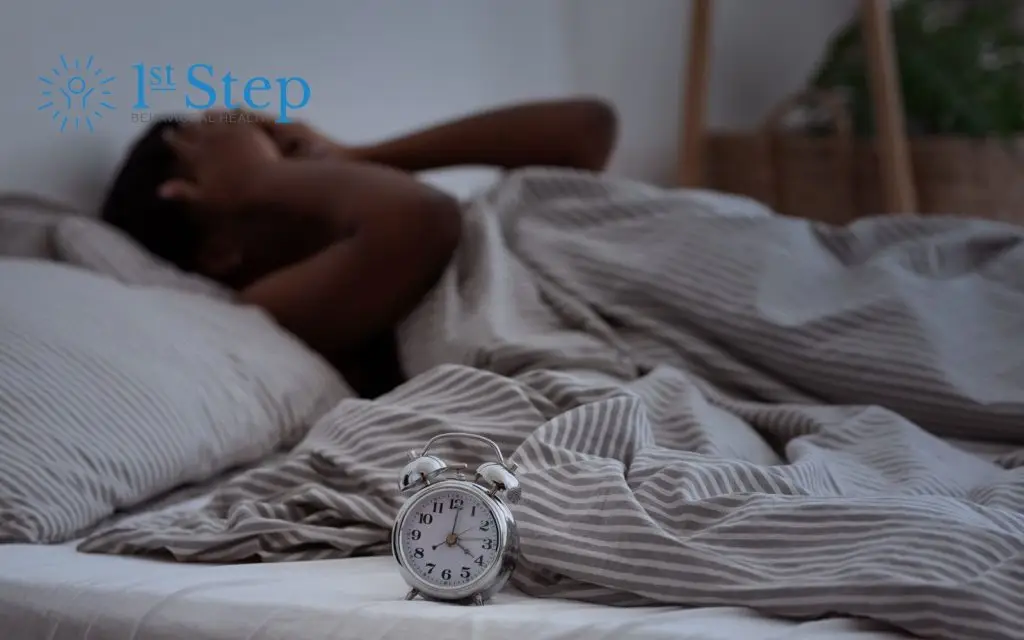Most people experience occasional sleep challenges. People may struggle to fall asleep, wake up throughout the night, or wake up too early in the morning. In many cases, sleep troubles are related to lifestyle factors or temporary stressors.
However, some people struggle with chronic insomnia that impacts their daily functioning. People with insomnia are at a higher risk of developing substance use disorder (SUD). Substance abuse can also worsen the symptoms of insomnia.
This article will explore the connection between insomnia and substance abuse. You will learn:
- The symptoms and causes of insomnia
- The connection between insomnia and substance use
- How to treat insomnia and addiction
- Signs you or a loved one needs addiction treatment
- Where to find comprehensive addiction treatment and recovery support
If you or someone you love struggles with mental health conditions or SUD, you are not alone. Contact the treatment specialists at First Step Behavioral Health to learn about our programs. Reach out to our team with questions, for assistance verifying your insurance, or to schedule an intake appointment.
What is Insomnia?
Insomnia is a common sleep disorder. Some surveys show that about 25% of people in the United States struggle with the symptoms of insomnia each year.
The main symptom of insomnia is difficulty getting adequate sleep. People with insomnia may have disrupted sleep patterns. They may have a hard time falling asleep at night or wake up before they have had enough sleep.
There are two types of insomnia: acute insomnia and chronic insomnia. Here is an overview of these sleep problems.
Acute insomnia
Acute insomnia describes short-term sleep disturbances. People with acute insomnia may have disrupted sleep for just a few nights. Typically, people can identify a cause of their short-term insomnia, including:
- An event they are excited or anxious about
- A significant life change
- Seasonal time changes
Most people will experience acute insomnia at some point in their life. Usually, acute insomnia resolves on its own without treatment.
Chronic insomnia
Chronic insomnia describes sleep difficulties that occur at least three nights per week for three weeks or more. Typically, people with chronic insomnia cannot identify the cause of their sleep troubles. In some cases, chronic insomnia may be a sign of an underlying physical or mental health condition.
A chronic lack of sleep can keep people from functioning at work or school. It can also harm a person’s mental and physical health.
What Causes Insomnia?
Insomnia can occur for a range of reasons. In some cases, people may not know what is causing them to struggle with sleep. In others, there may be a clear cause.
Here are some of the potential causes of insomnia.
Sleep apnea
Sleep apnea is a medical condition that causes airway obstructions and frequent nighttime waking. This condition prevents people from getting deep, restorative sleep.
Lifestyle factors
Irregular sleep-wake cycles, alcohol or caffeine intake, excessive screen exposure, and work schedules that don’t align with a person’s circadian rhythm are just a few of the lifestyle factors impacting sleep.
Chronic pain
Pain can keep people from getting the sleep they need. People with conditions causing chronic pain may lead to bouts of insomnia.
Mental health conditions
Anxiety, trauma, depression, and other mental health conditions can prevent people from getting adequate sleep.
If you or someone you love struggles with insomnia, contact the specialists at First Step Behavioral Health to learn about our treatment programs or find support.
What is the Connection Between Insomnia and Substance Abuse?
There is a link between insomnia and substance abuse. Understanding this complex link can help people get treatment to address both conditions.
First, people with insomnia may turn to addictive prescription or illicit drugs for relief. People may use drugs and alcohol to fall asleep at night. However, repeated drug abuse can quickly turn into physical dependence.
Substance abuse can also impact sleep quality. Abusing stimulants like cocaine, methamphetamine, or prescription ADHD medications (Adderall, Ritalin, etc) can significantly impact a person’s sleep.
People may also experience insomnia during withdrawal from drugs or alcohol. For example, insomnia is a common alcohol withdrawal symptom.
People who experience insomnia and substance abuse must seek dual diagnosis treatment programs to address both conditions simultaneously.
How to Treat Insomnia and Addiction
The National Institute on Drug Abuse (NIDA) recommends simultaneous treatment for mental health conditions and SUD. Treatment for insomnia and addiction may include:
- Assessments and screenings
- Medical detox programs (supervision, medications, mental health care)
- Behavioral therapies
- Medication management
- Individual, group, and family counseling
- Holistic therapies to soothe the mind and body, including relaxation exercises, mindfulness, nutrition support, yoga, and exercise
- Relapse prevention education
- Aftercare planning
People with insomnia and addiction can benefit from dual diagnosis treatment. During treatment, people get medical and mental health support to overcome addiction. They also receive tailored education and resources that can help them reduce or manage insomnia for life.
Find Treatment Now
If you or someone you love struggles with insomnia, substance abuse, or other mental health conditions, you are not alone. Contact the intake specialists at First Step Behavioral Health to explore your treatment options or set up a welcome appointment.
References:
- Penn Medicine: 1 in 4 Americans Develop Insomnia Each Year
- Science Direct: Insomnia symptoms in adulthood. Prevalence and incidence over 25 years
- National Institute of Health (NIH): Insomnia Symptoms in Patients With Substance Use Disorders During Detoxification and Associated Clinical Features
- Science Direct: Causal relationships between substance use and insomnia
Jump to a Section
Call (855) 425-4846
